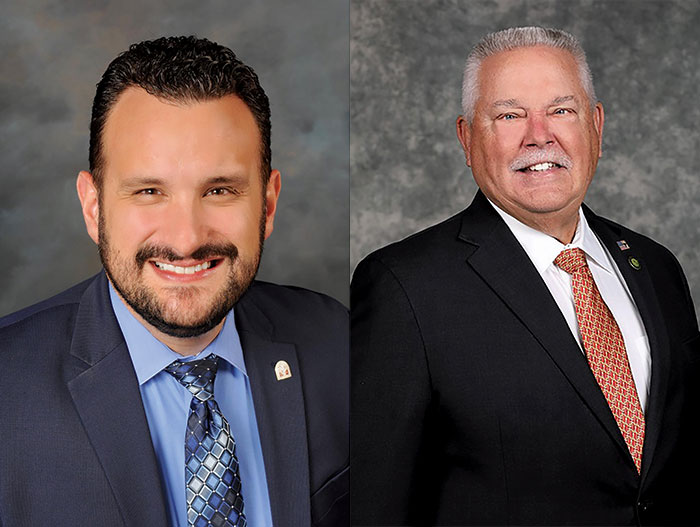Open candidate debate sets the tone (updated)
And just like that, voters received their only glimpse of open debate among candidates vying for a spot on the Claremont City Council.
The 3 candidates met together in open forum on Saturday for the first and last time before next week’s election. Active Claremont and the League of Women Voters hosted the late election event, giving residents their chance to discuss issues of local concern with candidates. About 40 people took advantage of the opportunity, filling the Padua Room at Claremont’s Hughes Center for the late morning question-and-answer. Ruth Currie served as moderator while Betsey Coffman, Dean McHenry, Dave Nemer and Jerry Klasik stepped in to help take written questions and time the candidates’ responses, keeping each to no more than one minute.
Water, pension plans and charter city status were featured topics of discussion as locals peppered Michael Keenan and incumbents Corey Calaycay and Larry Schroeder with about an hour’s worth of questions. While offering different solutions, each of the candidates remained resolved on moving forward with water acquisition, despite concerns. One writer, describing themselves as a Claremont resident who uses less than 12 cubic feet per month, questioned the advantage to buying the water company: “I see only increased costs to me,” they wrote.
Candidates reiterated that while the burden might be felt in the present, the benefits will be revealed in the long run as Golden State Water will not have the chance to continually increase rates.
“It’s not about having decreases in the immediate future,” said Mr. Calaycay. “It’s about the long term future, being able to control those rates and hopefully for future generations to have an opportunity for some of our surrounding communities’ rates to catch up with ours.”
Whether paying for the use of 5 cubic feet of water or 50, Mr. Schroeder noted that Claremont residents are paying more than neighboring cities and something needs to be done.
“In the future we are going to see higher and higher rates with Golden State and I think we need to get away from that, and I think we need to control that better,” Mr. Schroeder said.
Mr. Keenan agreed, stating “we should charge ahead,” but took the idea of local control a step further, stating that the city needs to do whatever necessary to maintain “home rule.”
“If we have to become a charter city to do it, then so be it,” he said.
Another writer asked the candidates to give the pros and cons behind charter city status, a concept that was discussed by the city council at its priority workshop in January, but rejected. While there are perks including more local control and overall efficiency—the city would be able to define its own governing system separate from state laws and regulations—the potential costs associated with the process were one of the reasons why the council opted to forego pursuing charter city status. Both Mr. Calaycay and Mr. Schroeder believed the city should focus its attention on the water purchase. Mr. Calaycay noted that the city’s counsel estimated applying for charter city status at this time could cost upwards of $500,000.
“Keep in mind at the end of the process you still need to go to a vote of the people in order to enact it,” Mr. Calaycay noted.
Mr. Keenan disagreed, stating his belief that the process would not cost half a million dollars: “It depends on the size of the city, but there is a transition cost,” he admitted. Recognizing incurred costs that will be coming with acquisition and possible eminent domain, Mr. Keenan offered a few suggestions. He proposed prioritizing issues and using solar programming to begin setting aside money.
“My sense of this is we would gain control of the water company first under eminent domain then we’d go after the rooftops and pool our solar easements and get all those carbon credits,” Mr. Keenan said. “This is all revenue that the city would have and then we would be more educated to go into the [charter city] process.”
Though Mr. Schroeder agreed that some of the benefits of being a charter city are desirable—being able to establish your own election rules, doing away with lengthy and complicated bidding procedures and state-prescribed hourly pay—he stated his content with Claremont as a general law city.
“It’s an expensive and lengthy process to draw up a charter and then you have to vote on it, and it may or may not pass,” Mr. Schroeder said. “I think we are doing just fine.”
When questioned about how the city is dealing with employee pension plans, Mr. Schroeder stated his contentment once more. He noted that over the past year the city has negotiated with employees to pay their share of the Public Employees’ Retirement System contribution (PERS), previously paid for by the city, and have modified contracts with incoming employees to ensure the same.
“We have done a lot this year to make sure that we were getting ahead,” Mr. Schroeder said.
Mr. Calaycay continued by adding that the city has used some of its fiscal surplus this year to pay off its pension deficit. Around $800,000 of that deficit has been paid, he noted.
“And we actually have amounts budgeted in the coming 2-year budget cycle to pay it down even further,” Mr. Calaycay said. “We are ahead of what other communities are doing and I’m pleased with that.”
Mr. Calaycay also mentioned he believes employees should be paying their full PERS contribution immediately, which is why he opposed the city’s decision to have employees pay their full PERS contribution over a 3-year period.
Mr. Keenan said he was pleased with the way the city has made attempts to make up for past exorbitant pension plans, but also noted what it has cost the city in the meantime.
“There are 40 people missing now,” Mr. Keenan said of those city employees who were laid off by the city several years ago. “Where are those people, where are they working?”
Candidates answered questions regarding the city’s tree policy, their views on the pledge of allegiance, and the ever-popular topic of coyotes before adjourning to meet with candidates. While it did not go without mention that many were pleased with the way the city is being run—it took a few moments for anyone to drum up questions, one noted—Claremont resident Katie Gerecke said she left the forum with a broadened understanding of the way the city is handling topics of interest to her, like the water acquisition and the city’s tree replacement policy. Having attended several forums in years past, she was particularly pleased with the partnership between Active Claremont and the LWV in this latest assembly.
“Ruth kept it moving and the answers given by the candidates were very specific,” Ms. Gerecke said. “The League of Women Voters always does a good job cooperating and coordinating with other groups in putting on these important events.”
The Claremont Municipal Election takes place this coming Tuesday, March 5. Check out Friday’s paper for the COURIER’s endorsements and a list of polling places.
—Beth Hartnett
news@claremont-courier.com








0 Comments